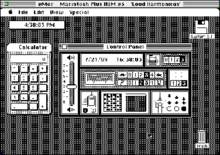| This article does not cite any sources. Please help improve this article by adding citations to reliable sources. Unsourced material may be challenged and removed. Find sources: "VMac" – news · newspapers · books · scholar · JSTOR (February 2012) (Learn how and when to remove this message) |
 | |
 Mini vMac running System Software 7 on Ubuntu Mini vMac running System Software 7 on Ubuntu | |
| Developer(s) | Philip Cummins Bill Huey Weston Pawlowski (Windows) Yoav Shadmi (DOS) Richard Bannister (Mac OS) Michael Hanni (Linux) David Bacher (OS/2) Paul C. Pratt (Mini vMac) |
|---|---|
| Stable release | 0.1.9 (vMac), 36.04 (Mini vMac) / April 26, 1999 (vMac), October 28, 2018 (Mini vMac) |
| Operating system | Microsoft Windows, Linux, Mac OS, NeXTSTEP, OS/2, DOS, iOS, Nintendo DS, Android |
| Type | Emulation |
| License | GNU General Public License |
| Website | www www |

vMac is a free and open-source Macintosh Plus emulator which is able to run versions of System 1.1 to 7.5.5. It is available for Windows, DOS, OS/2, Mac OS, NeXTSTEP, Linux, Unix, and other platforms. Although vMac has been abandoned, Mini vMac, an improved spinoff of vMac, is still actively developed.
vMac and Mini vMac support CPU emulation from Motorola 68000 to 68040, display output, sound, floppy disk insert, HFV image files, and more. Some vMac ports include extra features such as CD-ROM support, basic serial port (SCC) support, Gemulator ROM board support, and various performance improvements. Although the website is still in operation, most vMac development slowed to a halt in 1999, and no official releases have been made since. Many of the developer e-mail addresses listed on the website are not currently working.
Overview
| This section may contain material not related to the topic of the article. Please help improve this section or discuss this issue on the talk page. (February 2024) (Learn how and when to remove this message) |
Mini vMac, vMac's spinoff, is still being maintained and developed by Paul C. Pratt. Currently Mini vMac supports Macintosh 128K, 512K, 512Ke, Plus, SE and Classic, with active development for Macintosh II, Macintosh Portable and PowerBook 100 support. Due to complaints about the rarity of the original II, it also accepts Macintosh IIx and Macintosh SE/30 ROM files. The precompiled versions available for download at Mini vMac's SourceForge project emulates a Macintosh Plus with 4 MiB of RAM.
vMac and Mini vMac require a Macintosh Plus ROM file and Macintosh system software to work. Macintosh ROM files are owned by Apple and cannot be legally distributed. However, the Windows and Unix ports of vMac (not Mini vMac) support the Gemulator ROM board from Emulators Inc., which allows users to add genuine MacPlus ROM chips to their x86 machine via an ISA expansion slot. This board can also support ROM chips from other early Macintosh systems, but the publicly released versions of vMac only supported the Macintosh Plus. Macintosh system software is available from Apple's Support Downloads Website (see External links below).
As mentioned, Mini vMac also requires a specific ROM image for the computer emulation desired. A software application for these 68000 Macs may be downloaded from the Mini vMac website for retrieval of a system's ROM image, along with a complete tutorial for locating an old Mac, retrieving the ROM and working with disk images.
See also
- Basilisk II, an emulator of later 68k Macs.
- Executor (software), a emulator/compatibility layer for early 68k Macs.
- SheepShaver, an emulator of early PowerPC Macs.
- PearPC, an emulator of PowerPC Macs which can run Mac OS X and various open Unixes.
References
External links
- Official website vMac
- Official website Mini vMac
- archive of Apple's Support Downloads Website
- Guide to setting up System 6 in Mini vMac for Windows
- Creating a Mac-on-Stick using Mini vMac
- Emulators, Inc.